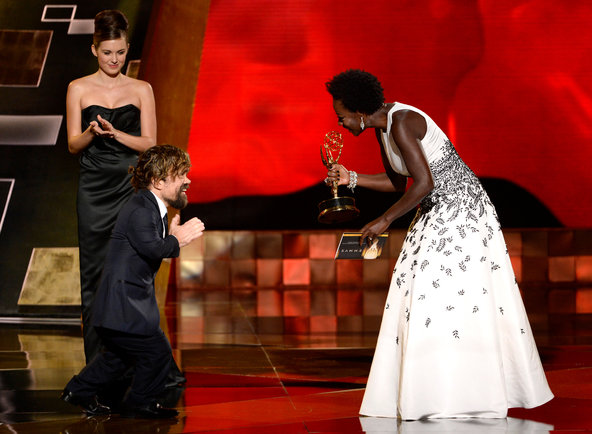Viola Davis’s win is the first for an African-American actress in the drama category. In 1966, Bill Cosby was the first African-American actor to win an acting award in any category — an honor he won for three years in a row in the drama category for his role on “I Spy.” Isabel Sanford was the first African-American actress to win the Emmy for best actress in a comedy series, in 1981, for her role in “The Jeffersons.” And the first African-American actor to win best actor in a comedy series was Robert Guillaume in 1985, for his work on “Benson.”
“Game of Thrones,” the HBO fantasy epic, was named best drama for the first time in the highly-rated show’s history, capping off a dominant night for the premium cable channel.
HBO’s “Veep,” the political satire about a venal, put-upon vice-president turned president, was named best comedy. It was the first time a show other than “Modern Family” had won the award since 2009. Julia Louis-Dreyfus, the show’s star, was named best actress in a comedy for the fourth year in a row. (See a full list of nominees and winners.)
Ms. Louis-Dreyfus’s triumph was one of the only routine events in a year that saw several notable acting wins.
Viola Davis won for ABC’s “How to Get Away With Murder,” becoming the first African-American actress to win a best drama actress Emmy.
“You cannot win an Emmy for roles that are simply not there,” she said in her acceptance speech. “So here’s to all the writers, the awesome people that are Ben Sherwood, Paul Lee, Peter Nowalk, Shonda Rhimes, people who have redefined what it means to be beautiful, to be sexy, to be a leading woman, to be black.” (Read entire speech.)
Jon Hamm, the star of “Mad Men,” put an end to a long Emmy drought, winning best actor in a drama in perhaps the most eagerly anticipated award of the night. It was the first time a “Mad Men” performer had ever won an acting Emmy, and it was Mr. Hamm’s first win after 16 nominations. (Those 16 included guest stints on “30 Rock” and “Unbreakable Kimmy Schmidt.”)
Jeffrey Tambor, who stars as a patriarch undergoing gender transition in Amazon’s “Transparent,” won the Emmy for best actor in a comedy.
Other acting winners included Allison Janney of “Mom” and Tony Hale of “Veep,” who won Emmys for best supporting acting in a comedy. Peter Dinklage of “Game of Thrones” and Uzo Aduba of “Orange Is the New Black” won the supporting acting awards on the drama side.
The Emmy ceremony took place at the Nokia Theater in Los Angeles. Fox broadcast the ceremony, which was hosted by Andy Samberg, the star of that network’s “Brooklyn Nine-Nine.” He opened the show with a musical number mocking the sheer volume of television shows and later gave out the log-in information for his HBO subscription. (The log-in worked, at least temporarily.)
Another big winner for HBO was the mini-series “Olive Kitteridge,” which dominated the new limited series category, which included both mini-series and anthology shows. “Olive Kitteridge” won the series award, both lead acting honors (Frances McDormand and Richard Jenkins), as well as awards for writing and directing.
This year the variety category was split into separate ones for talk and sketch, with the awards going to a hot upstart and an outgoing favorite. Amy Schumer, one of the most lauded performers in any medium this year, won an Emmy for “Inside Amy Schumer,” her Comedy Central sketch show. “The Daily Show With Jon Stewart,” also on Comedy Central, won the award for best talk series. Mr. Stewart left the show in August.
“Thank you very much,” he said in his acceptance speech. “You’ll never have to see me again.”
Viola Davis, after becoming the first African-American to win an Emmy for best actress in a drama, gave an acceptance speech that placed her award within the larger context of diversity in Hollywood.
‘In my mind, I see a line. And over that line, I see green fields and lovely flowers and beautiful white women with their arms stretched out to me, over that line. But I can’t seem to get there no how. I can’t seem to get over that line.’
That was Harriet Tubman in the 1800s. And let me tell you something: The only thing that separates women of color from anyone else is opportunity.
You cannot win an Emmy for roles that are simply not there. So here’s to all the writers, the awesome people that are Ben Sherwood, Paul Lee, Peter Nowalk, Shonda Rhimes, people who have redefined what it means to be beautiful, to be sexy, to be a leading woman, to be black.
And to the Taraji P. Hensons, the Kerry Washingtons, the Halle Berrys, the Nicole Beharies, the Meagan Goods, to Gabrielle Union: Thank you for taking us over that line. Thank you to the Television Academy. Thank you.o















